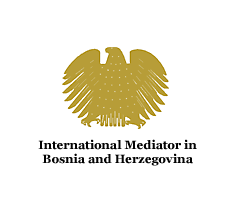TRIP REPORT 1/2000 - 2-12 MARCH 2000
IntroductionThe year 2000 could mark a turning point for Bosnia and Herzegovina, as well as the neighbouring states. Elections are to determine future governments in the region are the prime concern of the international community, and in some cases, such as Croatia, new governments with fresh ideas have been installed. As attention begins to turn to other flash points such as Kosovo, this is a time for the leaders in Bosnia to decide whether they will chose the path to Europe or remain in the vicious cycle of nationalistic power struggles and economic stagnation. Croatia has chosen a former path and set itself an ambitious agenda to reform its economy, welcome back pre-war inhabitants, and develop new institutions that better serve the needs of its citizens. Bosnia on the other hand must make these decisions in the coming weeks.
The new Croatian government's positive attitude to its future relations with BaH and Europe is a sign that possibly the democracy-building projects, both for Croatia and BaH, have a chance of succeeding. However, Croatia's ability to implement its agenda depends heavily on international financial and technical support. If the new leaders in Zagreb are left to deal with the complicated burdens it inherited from the previous government without the necessary tools, the future stability of the region will also be endangered. The new government in Croatia stands ready to accept help from the international community. For the EU the challenge is how it will harness this new energy into productive ways which will further the integration of south-eastern Europe into the European project.
In Bosnia and Herzegovina, the situation has not progressed as far as in Croatia; however, the impending elections will determine whether nationalistic structures will prevail or whether irresponsible politicians will draw electoral consequences. In Banja Luka a follow up meeting to the December 1999 Agreement produced mixed results. Particularly troubling was that given the rate of implementation it would take 26 years to resolve property cases in Banja Luka and 15 years for the entire RS. In Modrica, also in the RS, the situation has not progressed very much since the mediator's last visit in January 1999. Moreover, implementation of Dayton is unacceptably slow and the threat of security concerns any discussion on ways to seep up the process.
Lastly, the HDZ boycott of the follow-up and information visits in Mostar for Canton 7 and Capljina were the most controversial and disappointing aspects of the trip. Elected politicians must understand that their election constitutes a public contract with their citizens, state and the international community to uphold the rule of law and to work for the betterment of their society. If all politicians used external events to boycott progress or abandon their commitments, democracy as the safeguard of the will of the people will fail. By not attending the previously agreement meeting with the Mediator, the HDZ denied their constituency the right to be heard and represented. In the end their absence did nothing to further the BCroat agenda and constituted a breach of public trust.
The main theme of this trip was to determine what effects the Croatian elections had on the internal politics of certain segments of Bosnia, particularly Republika Srpska and Herzegovina. In addition, the Mediator concentrated on following up previous agreements and took up the challenge of visiting one of Republika Srpska's previously forgotten areas. The trip consisted of an information visit to Zagreb, focused on the relationship between the new government and BaH; an agreement follow-up meeting in Banja Luka; a mediation in Modrica; a follow-up meeting for Canton 7 in Mostar; and an information meeting in Mostar for Capljina. In all cases, it was clear that events such as elections, high level visits, and even decisions taken in the Hague by the ICTY have a direct baring on what happens at the local level. Consequently, it important for the Mediator to continue offering his service at different levels, including in neighbouring states when the situation calls for it, even when some participants threaten not to attend scheduled meeting due to boycotts or obstructionist tendencies.
In Zagreb Dr. Schwarz-Schilling and his delegation met with President Stipe Mesic, Foreign Minister Tonino Picula, Interior Minister Sime Lucin, Mr. Veljko Dzakula (Serb Democratic Forum), Mr Mate Gogic (Union of Refugee and DP Croats from Bosnian Posavina), Mr. Drazen Budisa (MP for HSLS party) OSCE HOM Bernard Poncet and EU troika Ambassadors.
The Mediator met in Banja Luka with Bishop Franjo Komarica and Minister for Refugees Miladin Dragicevic. In Mostar he met with the SFOR General Schwardorffer; and in Sarajevo he visited Federation President Ejub Ganic, Prime Minister Edhem Bicakcic, Mr. Kresimir Zubak, German Ambassador Hans-Jochen Peters, American Ambassador Thomas Miller and HNV President Ivo Komsic.
The delegation consisted of the International Mediator, Dr. Christian Schwarz-Schilling, Mr. Dieter Wolkewitz (Executive Representative), Mr. Gerald Knaus (Political Advisor and Sarajevo Representative), Mr. Juan Diaz (Political Analyst), Ms. Amela Curkovic (Interpreter). During his visits, the Mediator was accompanied by Mr. Goran Magas, the Advisor to the Federation Vice-President and Special Envoy for Drvar, Mr. Salko Beba, First Secretary of the Federation Vice-President, Ms. Mirsada Jahic, the Co-ordinator of the Task Force Group in the Federation Prime Minister's Cabinet for the Support of the Mediator's Activities and Mrs. Sabira Jahic, Assistant to the Federation Minister for Refugees.
The delegation would like to express its special gratitude to OSCE Operations for its logistical support; OHR, RRTF and OSCE officers in Zagreb, Sarajevo, Banja Luka, Doboj and Mostar for providing input and organisational support. During the trip the delegation was assisted also by ECMM, IPTF,OHR/RRTF, OSCE, SFOR, UNHCR and the Federation Ombudsmen.

